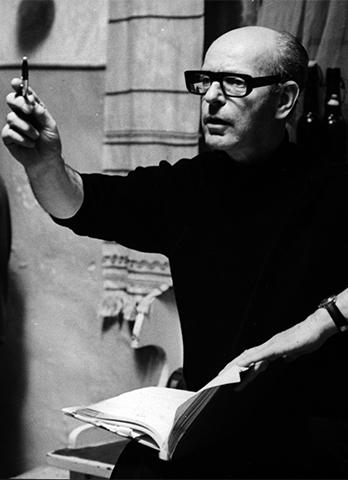Kurt Maetzig (Kurt Maetzig)

Kurt Maetzig was the son of Robert Maetzig and Marie Maetzig (née Lyon). He grew up in the Charlottenburg borough of Berlin, where he gained an insight into the film industry from an early age as his father was the proprietor of a factory that produced film copies there. During the First World War, he stayed with his grandmother in Hamburg. After the end of the war, he moved back to Berlin, where he completed his secondary education at the Leibniz-Oberrealschule. He then enrolled at the Technical University of Munich (TUM), where he studied chemistry, engineering and political and business economics. He also studied sociology, psychology and law for a year at the Sorbonne in Paris. In the late 1920s, Maetzig worked at his father’s factory during the holidays, gaining experience in all areas of film production. He began shooting his own films in 1932, and three years later he ran his own cartoon workshop, where he also worked on titles and opening credits for short films. He received his PhD from TUM in 1935 after he had completed his dissertation entitled “The accountancy of a film-copying institution.” He then worked for various firms, including his father’s, where he worked on film technology and photochemistry, and also gave lessons on copying techniques and problems with sound and colour in films. However, following the Nuremberg Laws of 1935, his work permit was revoked by the Film Chamber of the Reich in 1937 due to his mother’s Jewish heritage.
During the Second World War, Kurt Maetzig was a member of the illegal Communist Party. After the war, he moved back to Berlin, where he co-founded a group called “Filmaktiv” in 1945, whose aim was to organise a resumption of film production. He joined the newly founded state-owned film studio, the Deutsche Film-Aktiengesellschaft (DEFA) in 1947, where he worked as a director both of documentaries and feature films. He was also the first director and editor of the weekly newsreel “Der Augenzeuge” (English: The Eyewitness). Kurt Maetzig’s first feature film was Ehe im Schatten (Marriage in the Shadows), released in 1947. It was the most successful film of the post-war period, attracting over 12 million viewers in total. His other notable films include Die Buntkarierten (1949), which was entered into the Cannes Film Festival, the Ernst Thälmann films (1954–55), and the science fiction film Der schweigende Stern (1960). He also directed the film Das Kaninchen bin ich (The Rabbit is Me) (1965), which was one of twelve films that were banned in East Germany after the 11th plenum of the SED’s Central Committee for being too critical of the internal social problems within the country. He retired as a film director in 1976. He died on 8 August 2012 in Wildkuhl, Mecklenburg.
Born
- January, 25, 1911
- Berlin, Germany
Died
- August, 08, 2012
- Mecklenburg-Vorpommern, Germany



